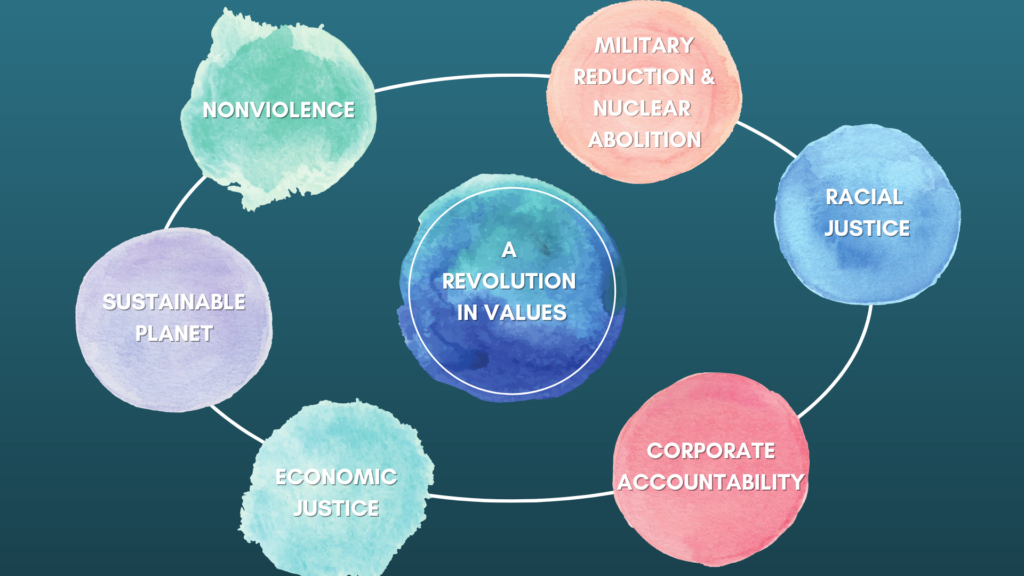A Radical Revolution Of Values

“We must honestly face the fact that the movement must address itself to the question of restructuring the whole of American society… A nation that will keep people in slavery for 244 years will ‘thingify’ them and make them things. And therefore, they will exploit them and poor people generally economically. And a nation that will exploit economically will have to have foreign investments and everything else, and it will have to use its military might to protect them. All of these problems are tied together. What I’m saying today is that we must… say, ‘America, you must be born again!'” –Dr. Martin Luther King, Jr., “Where Do We Go From Here?,” August 1967
Today, the world’s nation states are overwhelmed and weakened by the unprecedented forces of transnational interests. Fueled by advances in telecommunications and scientific technology, the world’s people and resources are increasingly subjugated by, and at the mercy of, the rogue power of intercontinental corporations, terrorist cells, and the commodification of human beings. Dr. Martin Luther King, Jr. was prescient fifty years ago when he declared that militarism, racism, and poverty were three interconnected “evils” that could only be inadequately addressed if treated separately; if he were alive today, he might have added a fourth, environmental degradation.
A root cause of all these ills is a global culture that values profit over stewardship of the earth and its inhabitants. With a materialistic “winner take all” system comes unspeakable violence, with the poor, women, indigenous peoples, and nature as the chief collateral damage; hunger, polluted water, and disease; climate change from the plunder and deforestation that threatens every ecosystem; racism and other rigid caste systems; disregard for the value of labor; the consolidation of wealth in the hands of a few and increased poverty among the many; the twin resulting phenomena of massive displacement and gated communities; and the breakdown of a culture of engaged citizenship and robust democracy in the wake of this transnational oligarchy.
At the same time, activists for justice have built on fifty years of civil rights advances to unite across lines of difference such as class, race, religion, ethnicity, ability, and gender and build a world based on solidarity. They are harnessing these same technological advances to travel around the world, connect, educate and organize electronically through social media, develop scalable alternative energy sources, and redirect financial markets into a “new bottom line” of socially responsible investment. More and more young adults are interested in learning the simpler daily practices of their forebears in, for example, growing their own food, living communally, and exploring spiritual practices that incorporate nonviolence.
Chicago Area Peace Action (CAPA), founded in 1978 as the North Shore Peace Initiative to promote nuclear disarmament, increased the breadth of its involvement over the decades, recognizing that in this globalized political and economic climate, eliminating weapons is not enough to bring about a peaceful and just society. To advance communities that are just, inclusive, diverse and nonviolent, CAPA as a grassroots, membership-based organization has incorporated community education and advocacy to reduce military spending, stop armed conflicts in Iraq, Afghanistan, Syria, Israel and other parts of the world, promote renewable energy production in Illinois, and take a stand against police brutality, Islamophobia, and mass incarceration of African Americans and undocumented immigrants.
Social justice and peace organizations that choose to focus on one issue area and ignore others may save a tree but lose the forest. Even then, the lone tree may die for lack of the nourishment required for health and growth. Moreover, a laser-focused solution, such as nuclear weapons elimination, is doomed to be at best a temporary solution because it does not respond to why there is a demand for these killing machines in the first place. Unless there is a concerted effort to eliminate fear of the Other, unjust distribution of resources, and economic inequality under capitalism, demand will remain. This is the true meaning of “intersectionality.” In reality, as the U.S. Supreme Court asserted, “money, like water, will always find an outlet,” 1 and the flow of weapons will simply shift to a different cataract.
At bottom, what is required is the fundamental shift in culture that Dr. King described in his famous 1967 speech at the Riverside Church in New York City: “We as a nation must undergo a radical revolution of values. We must rapidly begin … the shift from a thing-oriented society to a person-oriented society. When machines and computers, profit motives and property rights, are considered more important than people, the giant triplets of racism, extreme materialism and militarism are incapable of being conquered.”
This means that CAPA must consistently hold elected officials, business leaders and other power brokers accountable for “upholding high principles and thinking of the long-term common good,” as Pope Francis called for in his 2015 Encyclical Laudato Si, ostensibly focused on the environment but incorporating related issues such as poverty, violence, homelessness. In bringing attention to the revolution in values at the heart of its education and advocacy, CAPA must push people to think, perhaps to the point of discomfort, about how they support the status quo; and simultaneously, CAPA must offer its membership and the public ways to take action for social change. In the end, CAPA strengthens its effectiveness by expanding upon its founding principle, that of rejecting reliance on U.S. military might as the answer to global conflicts. The corollary is that the answer to global conflicts is the cultivation of mutual respect, the absence of fear, and a culture of stewardship that defines the peaceful community. Through its own efforts and in partnership with other Chicago-area and national groups, CAPA and its members become the change they wish to see in the world.
CONTACT US
If you would like more information, to volunteer, or intern for CAPA please contact us
